How to say goodbye in russian
How to say goodbye in russian
Russian Greetings and Goodbyes
Most Popular Russian Greetings
Здравствуй [ZDRAST-vooy] hello
Здравствуйте [ZDRAST-vooy-tye] – hello
“Здравствуй” and “здравствуйте” are formal greeting. “Здравствуй” is used with someone you know very well, or anyone whom you can address in “ты”. “Здравствуйте” is used when saying “hello” to several people or someone whom you would address in “вы” in Russian.
Привет [pree-VYET] hi
“Привет” is informal greeting, and is primarily used in spoken Russian. You would usually say “Привет” to someone you know very well, and someone you address in “ты” in Russian. There are some of the most popular variations of the “Привет in Russian:
Приветик [pree-VYE-teek] hi (diminutive form)
You will notice I often say “приветик ” in my video lessons.
Приветики [pree-VYE-tee-kee] hi (diminutive form)
You can also greet someone you know very well by saying:
Здорово! [zda-RO-va] hello, hi
During the different times of the day, you can use these greetings
Доброе утро [DOB-ra-ye OOT-ra] good morning
Добрый день [DOB-riy DYEN’] good afternoon
Добрый вечер [DOB-reey VYE-chyer] good evening
If you like to wish “good night” in Russian you can say:
Доброй ночи [DOB-ray NO-chee] good night
Спокойной ночи [spa-KOY-nay NO-chee] good night
How to Say Good-Bye in Russian
Some of the most popular ways to say “good-bye” in Russian is
До свидания [da svee-DA-nee-ya] good-bye
До свидания is a formal good-bye, and you would use it with a person or people whom address in “вы”.
Пока! [pa-KA] bye
Пока is informal, and is used spoken Russian with someone you can address in “ты”.
The “good-byes” below are informal, but sometimes they can be used in formal situations. This would depend on the context and on whom you are speaking with. If you are at a workplace, and you are unsure you can always say “до свидания” until you get to know people you work with a little better.
До завтра! [da ZAF-tra] See you tomorrow!
До послезавтра! [da pas-lee-ZAV-tra] see you the day after tomorrow!
До встречи! [da FSTRYE-chee] See you later!
До вечера! [da VYE-chi-ra] See you tonight!
Прощай! [pra-SHAY] Good-bye
“Прощай” is rarely used in spoken Russian, but you might see it in Russian literature. “Прощай” conveys dramatic mood and usually, you would say “прощай!” if you think that you will never see that person again.
On the contrary, if you know exactly when you will see your friend, you can use any of the “good-byes” below
До пятницы! [da PYAT-nee-tsi] till Friday
If you know you will see your friend on Friday, or you can always substitute Friday with another day of the week.
До апреля! [da ap-RYE-lya] till April
You can substitute April with a different month.
Увидимся в воскресенье! [oo-VEE-deem-sya v vask-ri-SYEN’-ye] see on Sunday!
Of course, in all examples above you can substitute days of the week or months above with any other day of the week a month, or a date.
These two “good-byes” are variations of “пока”.
Покедово! [pa-KYE-da-va] bye (informal)
“Покедово!” comes from of “Пока!” and is also used in informal speech.
Пока! Пока! [pa-KA pa-KA] bye
Давай! [da-VAY] bye
“Давай!” means “Give!” or “Let’s…” literally, but in this case it’s used as a slang word and is used as “bye” in Russian.
“See you” in Russian is:
Увидимся! [oo-VEE-deem-sya] See you!
If you would like to learn more interesting Russian greetings and “good-byes” you can read my article Greetings in Russian that you Won’t Find in Textbooks.
Not just ‘do svidaniya’? Choosing the correct ‘goodbye’ in Russian
1. The everyday person, keeping faith in a bright tomorrow
1) Уви́димся! – (“We’ll see each other!”)
2) До встре́чи! – (“Till we meet again!”)
These goodbyes inject a sense of stability into the lives of anyone who uses them, and provide a belief in a bright tomorrow. Here’s an interesting factoid: the “До свидания” and “До встречи” farewells share the same construction (the preposition ДО + Gen), with the words “свидание” and “встреча” being synonymous in this context. But, if the former absolutely does not imply that the interlocutors will meet each other again in the near future, the latter is used in situations where a meeting has been agreed upon in advance and is presumed to take place.
2. The fatalist
Now, when you’re faced with situations with no certainty and the person whom you’ve just spoken to ends up being blacklisted by you, you’ll want to use the following word:
A simple and short, “Прощай” lets the interlocutor know that the two of you will never be seeing each other again. This option is a good fit for situations that may involve a short summer fling or a dramatic departure into obscurity before loudly slamming the door on your way out. It can also, however, be used in situations where the two sides harbor no ill will towards each other, but have come to terms with their irreconcilable differences, accepting that it’s just not in the cards for them to ever see each other again.
3. The well-wisher
Polite people will often wish each other well, in lieu of using classical farewells. Some constructions involving the word “ночь”, for example, (examples 3, 4) may be used during conversations continuing late into the evening, when the conversation has clearly dragged on and it’s time to get ready for bed:
1) Всего́ хоро́шего! – (“All the best!”)
4. The polyglot
Farewells borrowed from other languages are also readily used in Russian. The level of popularity of any phrase is normally determined by what TV shows happen to be the hit at the time. For instance, words like “Ciao” and “arrivederci” arrived in Russia on the wings of the love for Italian cinema that exploded in the 1980s, thanks to classics starring actor Adriano Celintano; meanwhile, the wave of popularity enjoyed by Latin-American soap operas created in the 1990s led to passionate words like “adios” being used. Today, such words are considered a bit pretentious and can only really be heard in the company of polyglots or in the lyrics of the chorus to some clingy pop song.
5. The typical male style
A degree of gender coloration is present in the Russian language, with a number of options available with a definite male twist:
— Ну, дава́й (“Well, go on then.”)
— Ну, быва́й (“Well, be then”. we’ll get to that one in a second).
Such expressions exhibit a degree of laconicity and simplicity, so are often heard in the speech of soldiers and other servicemen. “Бывай” is an imperative form (an order) of the word “бывать”, which is really a shorthand mutation of the phrase: “Continue to be, you’re not doing too bad.” The same group also contains the following somewhat strict and emotionless phrase:
— На свя́зи! (“Be in touch!”)
Lovers of this variant are likely to always remember to actually stay connected and are likely to reach and be reachable in this fast-paced modern world at any given time. They are at their heart cold radio comms operators.
6. Farewells your Mom is likely to find annoying
Slang versions of the standard “пока” and “до свидания” enjoy popularity among teenagers for the most part, but often annoy the heck out of grown-ups, or anyone slightly older than 16:
They sound giddy, but crude, and are more fit for situations where one might wish to say “прощай”, but also wants to add a dose of disdain into the mix. There’s a theory that “Досвидос” borrows its suffix from the Spanish “adios”, which would again hint at the love that Russian-speakers once used to show for Latin-American soaps.
If using any of Russia Beyond’s content, partly or in full, always provide an active hyperlink to the original material.
How to Say Goodbye in Russian: Pronunciation and Examples
teekid / Getty Images
The most common expression for goodbye in Russian is До свидания (Dasvidaniya). However, there are several other ways to say goodbye in Russian, including very formal and informal expressions. This list includes examples, meaning, and pronunciation of the ten most popular Russian expressions for goodbye.
До свидания
Pronunciation: dasviDAniya
Translation: until we meet again
Meaning: goodbye
This versatile expression is suitable for any situation, formal or informal, although it can sometimes sound a little too formal when used with very close friends and family.
— До свидания, Мария Ивановна, спасибо за всё (dasvidanyia, maREEya eeVAnavna/eeVANna, spaSEEba za vsyo)
— Goodbye, Maria Ivanovna, thanks for everything.
Pronunciation: paKAH
Translation: for now
Meaning: later, see you, bye
The most popular way to say goodbye in Russian in informal situations, пока is perfect when speaking to anyone whom you would address as ты (singular/informal «you»), such as friends, family (apart from those members of the family whom you would address as вы out of respect), children, and good acquaintances.
— Пока, увидимся (paKAH, ooVEEdimsya)
— Bye, see you later.
Прощай
Pronunciation: praSHAI
Translation: forgive me
Meaning: farewell, goodbye forever
Прощай is used when the speaker knows that they are unlikely to ever see the other person again, for example, if one of them is moving away forever, are on their deathbed, or are breaking up. It carries the additional weight of asking for forgiveness for anything that may have happened before. This way to say goodbye is final and not used very often.
— Прощай, моя любовь (praSHAI, maYA lyuBOF’)
— Farewell, my love.
Давай
Pronunciation: daVAI
Translation: give me, go on, come on
Meaning: see you, bye, later
Давай is another informal way to say goodbye and means «come on» or «bye.» It can be used in its plural form as давайте when addressing a group of people. It is not appropriate for the more formal register.
— Всё, давай (VSYO, daVAI)
— Okay, see you later.
До скорого
Pronunciation: da SKOrava
Translation: until soon
Meaning: see you soon
A shortened version of до скорого свидания (da SKOrava sveeDAniya)—until we meet again soon—this expression is quite informal and can be used with friends, family, and good acquaintances.
— Ну, мы пойдём, до скорого (noo, my payDYOM, da SKOrava)
— We’re going now, see you soon.
Счастливо
Pronunciation: shasLEEva
Translation: happily
Meaning: have a good day, good luck, have a good trip
Счастливо can be used both with close friends and people you don’t know very well, although it has an informal register.
Всего
Pronunciation: fsyVOH
Translation: all, everything
Meaning: all the best
Всего is a shortened version of всего хорошего and means all the best.
Счастливого пути
Pronunciation: shasLEEvava pooTEE
Translation: have a happy trip
Meaning: have a good trip
This expression is used when saying goodbye to someone who is taking a trip. It is very versatile and can be used in both formal and informal situations.
— До свидания, счастливого пути! (dasviDAniya, shasLEEvava pooTEE)
— Goodbye, have a good trip!
Держи нос морковкой
Pronunciation: dyrZHEE nos marKOFkay
Translation: hold your nose to make it look like a carrot
Meaning: take care, look after yourself
This expression is part of a longer saying держи нос морковкой, а хвост пистолетом (dyrZHEE nos marKOFkay ah KHVOST pistaLYEtam), which means «hold your nose to make it look like it’s a carrot, and your tail as if it’s a gun.» There are several different versions of the same expression, such as нос пистолетом, or нос трубой, but they all mean the same thing: that the speaker wishes you to be happy and look after yourself.
— Ну пока, держи нос морковкой (noo paKAH, dyrZHEE nos marKOFkay)
— Bye then, be good.
Счастливо оставаться
Pronunciation: shasLEEva astaVATsa
Translation: stay here happily
Meaning: take care
The expression счастливо оставаться is used when addressing someone who is staying while the speaker is leaving.
— Спасибо за гостеприимство и счастливо оставаться (spaSEEba za gastypreeIMSTva ee shasLEEva astaVAT’sa)
— Thank you for your hospitality and take care.
There are quite a few ways to say goodbye in Russian. The basic one, that you will see in every textbook, is до свид а ния (goodbye) [dasvidania]
It is the most universal of the Russian goodbye phrases, appropriate in formal and informal settings. It is also the blandest of all possible options. So don’t just learn how to say “dasvidania”. Let’s spice things up a bit and learn other ways of taking leave in Russian.
Sometimes you might hear a phrase дав а й, до свид а ния or ну дав а й, до свид а ния. This might be confusing since the verb дав а й is the imperative form of дав а ть (to give). But in a phrase such as дав а й, до свид а ния it is used as an interjection with a meaning similar to “c’mon” or “let’s”.
Реб я та, бар закрыв а ется. Дав а йте, до свид а ния! – Guys, the bar is closing! C’mon, goodbye now!
Sometimes you won’t hear either до свид а ния (dasvidania) or пок а (paka), but instead something like this:
До ск о рого! – See you soon!
The full version would be до ск о рого свид а ния, but the word свид а ние (a meeting) is omitted. До ск о рого is rather informal and is used without specifying the time or location of the next meeting.
However, in the phrase до ск о рой встр е чи, the word встр е ча (a meeting) is never dropped, but the word ск о рая might. And then you’ll have до встр е чи (see you soon; until next time). If you want to specify the time or location of the next meeting, use this phrase.
Всег о хор о шего (all the best) is another good phrase to use when saying goodbye in Russian. It’s closest in meaning and the level of formality to the English phrase “take care”.
You might hear Russians use various interjections before any of the above words:
Ну, пок а
Дав а й, до ск о рого!
Л а дно, до встр е чи
Ну л а дно, дав а й, всег о хор о шего.
It is as if Russians try to avoid прощ а ние (saying goodbyes). Indeed, while the phrase “to say goodbye” in Russian is прощ а ться/прост и ться, Russians will avoid using the word прощ а й (farewell) except, maybe, in lyrics or in speeches. Consider this dialogue between two friends:
It is considered хор о ший тон (common courtesy) to передав а ть прив е т (to send one’s best) to family or о бщие друзь я (mutual friends).
Перед а й прив е т м а ме – Send my best to mother
Вад и м переда ё т всем прив е т – Vadim is sending his best to everyone
До ск о рого, передав а й прив е т семь е – See you soon, send my best to the family
You can find even more Russian words for goodbye along with pronunciation guides on our page Russian Farewells – Прощание.
Спас и бо и до ск о рой встр е чи!
Image source: flickr/rpongsaj cc-by-2.0
How to say goodbye in russian
When you’ve just started studying a foreign language, you may not be able to keep up conversations in it, but you should at least know the basic rules of politeness. Greeting and saying goodbye are the most essential aspects of day-to-day communication, and they can make or break your future encounters with native speakers.
Today, RussianPod101.com will teach you how to say goodbye in Russian for a variety of life situations. After learning the following ten phrases, you’ll be much more confident when meeting and speaking with Russians.
Let’s get started! Start with a bonus, and download the Must-Know Beginner Vocabulary PDF for FREE!(Logged-In Member Only)
1. До свидания (Do svidaniya)
До свидания (Do svidaniya) is the most popular way to say goodbye in Russian. The literal translation of this expression is “Until we meet again.” Its English equivalent is “Goodbye.”
This versatile Russian phrase for goodbye is suitable for any formal situation. Keep in mind that it may sound a little too formal if you’re chatting with good friends or family.
Feel free to implement this expression while talking to someone who is older than you or anyone you’re not very close with. Look at the following example:
Here, we put the pronoun Вам (Vam) instead of Тебе (Tebe). Anytime you say До свидания (Do svidaniya), you need to use the polite forms of any other words in that sentence.
You should definitely learn more about Russian forms of address in order to be polite while talking to older people (and to avoid awkward situations)!
2. Пока (Poka)
Пока (Poka) is the most popular informal expression for saying goodbye in Russian. Its literal translation is “For now,” but it’s just like saying “Bye” in English.
You may use Пока (Poka) in any everyday situation, toward anyone you would address informally as Ты (Ty). This kind of goodbye in Russian is appropriate for ending conversations with friends and close relatives. For instance:
You may also say Пока-пока (Poka-poka). The meaning won’t change at all, but your farewell will be longer, warmer, and friendlier.
3. Прощай (Proshchay)
This Russian word for goodbye isn’t very common, so you probably won’t hear it in everyday conversations. The literal translation of this word is “Forgive me.” By saying it, you mean “Farewell” or “Goodbye forever.”
Прощай (Proshchay) is used when the speaker knows that he or she won’t see the other person again. It’s suitable to use when somebody is moving away, lying on their deathbed, or breaking up with a girlfriend or boyfriend.
This is the perfect parting word to use when you want to say goodbye and ask for the other person’s forgiveness at the same time. This word carries the additional weight of admitting guilt, and it sounds really sad. Here’s an example:
You’ve probably noticed that the example above uses informal language. If the situation was formal, you would use the polite form Прощайте (Proshchayte).
Sometimes saying goodbye is heartbreaking… And you need special words for it.
4. До встречи (Do vstrechi)
До встречи (Do vstrechi) is one of the safest expressions for saying goodbye in Russian. We say this because it’s appropriate for both formal and informal conversations with people of different ages.
The literal translation of this phrase is “Until the next meeting,” but it’s more like saying “See you soon” in English. Of course, you should only use this phrase to part ways with people you’ll definitely be seeing again. Check this example:
5. До скорого (Do skorogo)
Another phrase you should know for saying goodbye to close friends and family is До скорого (Do skorogo). Its literal meaning is “Until soon,” but it’s really just another way to say “See you soon.”
This is a shortened version of До скорого свидания (Do skorogo svidaniya), which is translated into English as “Until we meet again soon.” For your information, the long version isn’t used in modern Russian.
Here’s an example of how to use this Russian informal goodbye phrase:
The most appropriate situation for using this expression is when you know you’ll see the person again very soon. For example, if you’re working, studying, or even living together.
Saying goodbye is not sad when you know that you’ll see the person again soon!
6. Увидимся (Uvidimsya)
This expression means almost the same thing as the previous one. Увидимся (Uvidimsya) is literally translated into English as “See each other.” It’s like saying “See you soon” in English.
This phrase is a good way to say goodbye in Russian in more casual situations. You may say Увидимся (Uvidimsya) to your friends if you know you’ll see them again in the near future, like in the following example:
You may also say the longer version: Ещё увидимся (Eshchyo uvidimsya). The meaning will stay the same.
7. Спокойной ночи (Spokoynoy nochi)
Спокойной ночи (Spokoynoy nochi) is a good phrase for ending a conversation late in the evening. The literal translation of it is “Have a calm night,” and it’s like saying “Goodnight” in English.
This phrase is very versatile, and you can use it in both formal and informal situations. This language construction is appropriate for when it’s late, and you know that the person whom you’re talking to is going to bed. Look at this simple example:
There are some Russian equivalents for this phrase, as well:
This one sounds good in both formal and informal situations.
This one sounds very informal and even romantic, so you’d better save it for use with really close friends or your sweetheart.
If someone wishes you goodnight every day, you’re happier than many people.
8. Мне пора (Mne pora)
This is a great example of how to say goodbye in Russian when leaving a formal conversation. Мне пора (Mne pora) may be literally translated as “It’s time for me,” but it actually means “It’s time for me to go.”
Using this phrase implies that you not only need to cut the conversation short, but that you also need to leave your current location. It’s a good idea to elongate it with a more traditional way of saying goodbye in Russian, like in the example below:
You may also say:
9. Счастливо (Schastlivo)
Счастливо (Schastlivo) is a colloquial phrase for ending everyday conversations. The literal translation of it is “Happily,” and it’s like saying “All the best” in English.
We recommend that you use this phrase with people whom you know pretty well—otherwise, it would sound overly familiar. This is a good example of how it should be used:
Pay attention to the stress. In this case, it falls on the vowel И, not on А like in all of the other cases.
10. Давай (Davay)
The literal translation of this word is “give” or “let’s,” but people often use it to mean something like “Bye-bye” in Russian.
Russians often use this word to say goodbye after a phone call or Skype chat with friends. Here’s an example:
You should only use this goodbye phrase with your friends, acquaintances of your age, and close relatives.
Most Russian Skype sessions end with the word Давай. Russians really love this way of saying goodbye!
11. Conclusion
All of the words and phrases we covered in this article are used regularly in Russia. If you’re only a beginner, it’ll be sufficient for you to learn one formal, one informal, and one universal phrase from this article. If you’re an intermediate or advanced student, you’d better learn all ten of them (or even more!).
Please remember that if you need more help saying goodbye in Russian—or any other aspect of the Russian language—we have a Premium PLUS service called MyTeacher. One-on-one tutoring with your personal teacher will help you succeed at any point of your language-learning journey.
Do you know any other ways to say bye in Russian that we didn’t mention in this article? If yes, please leave a comment below.

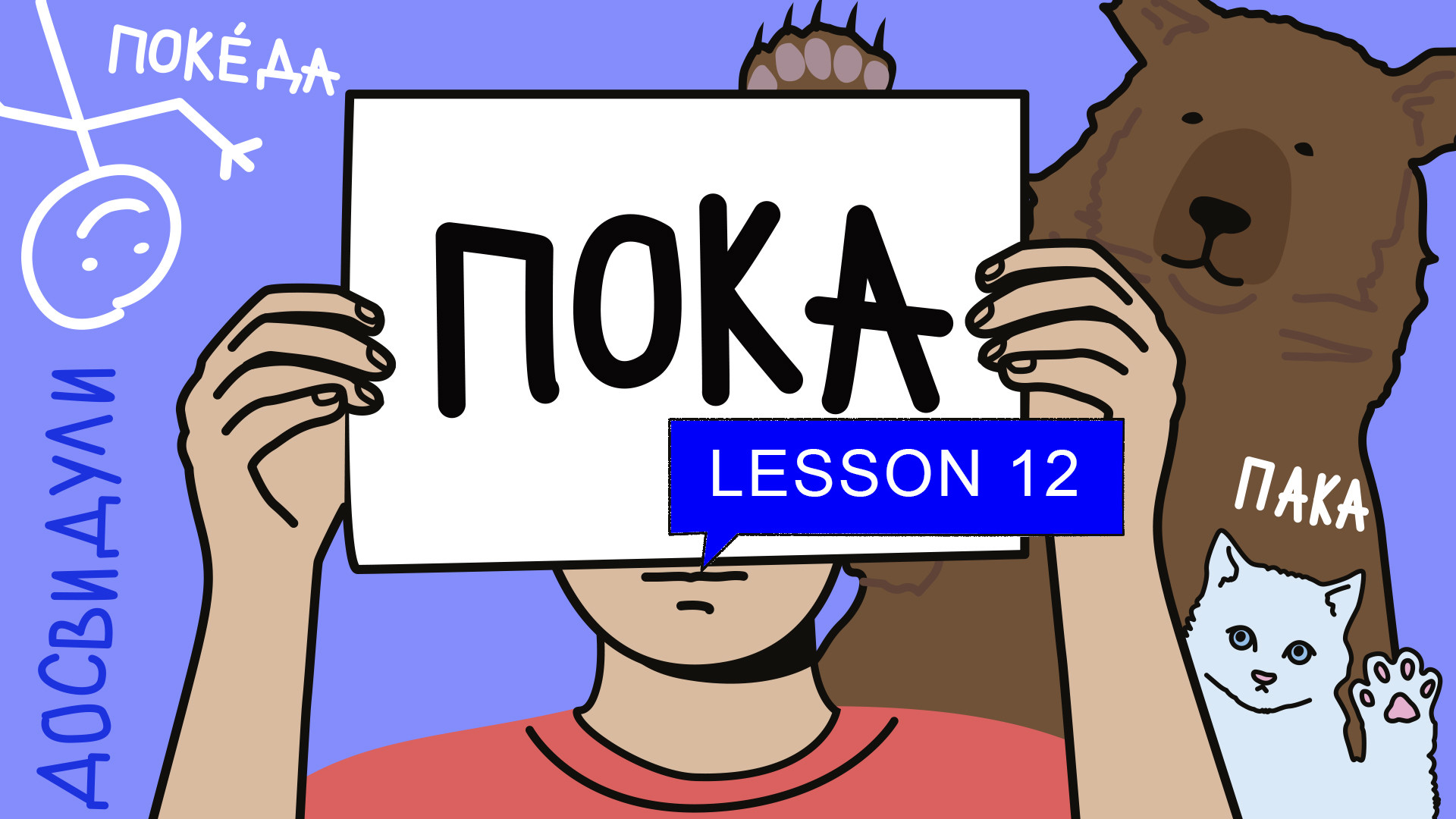
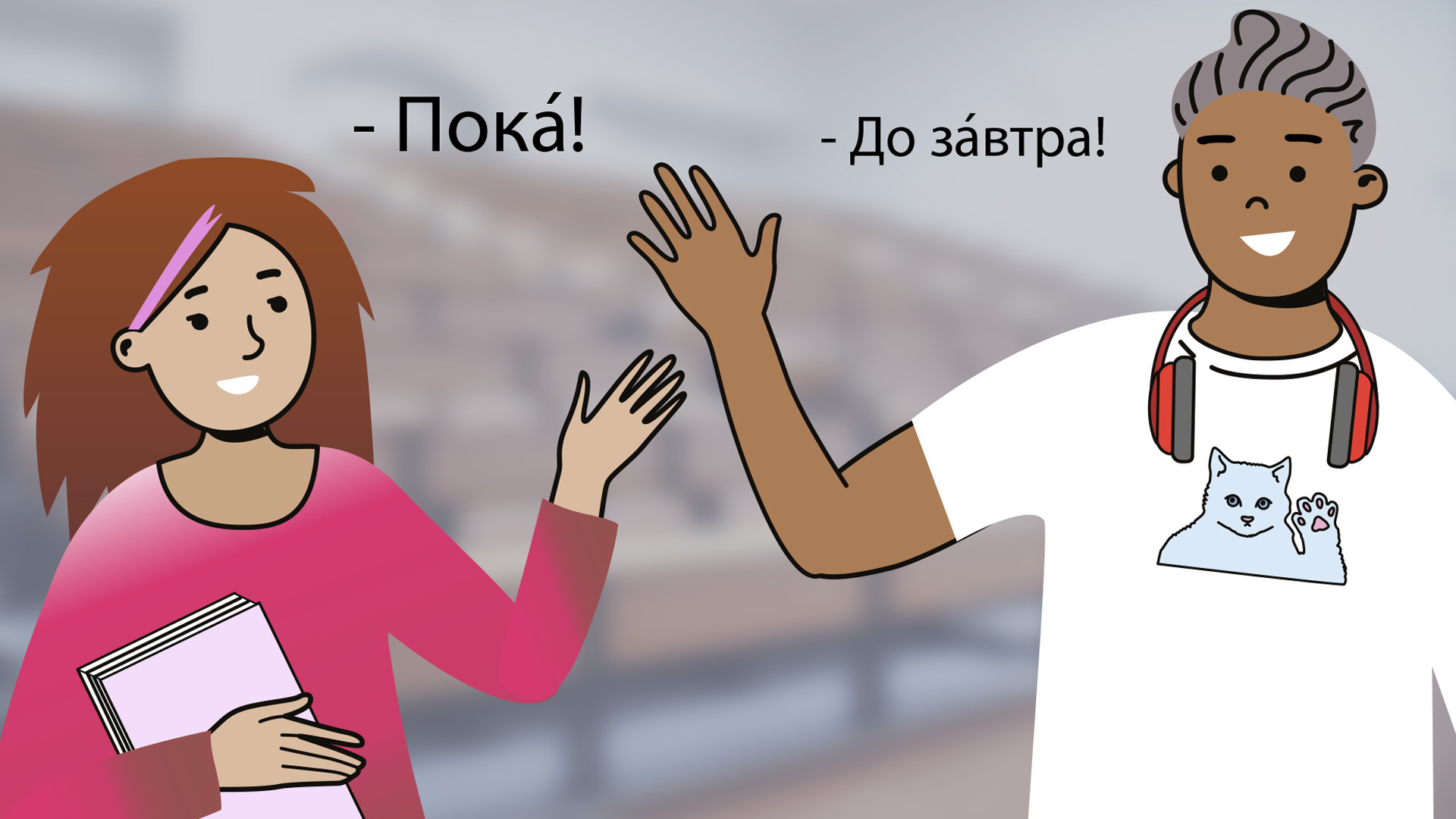
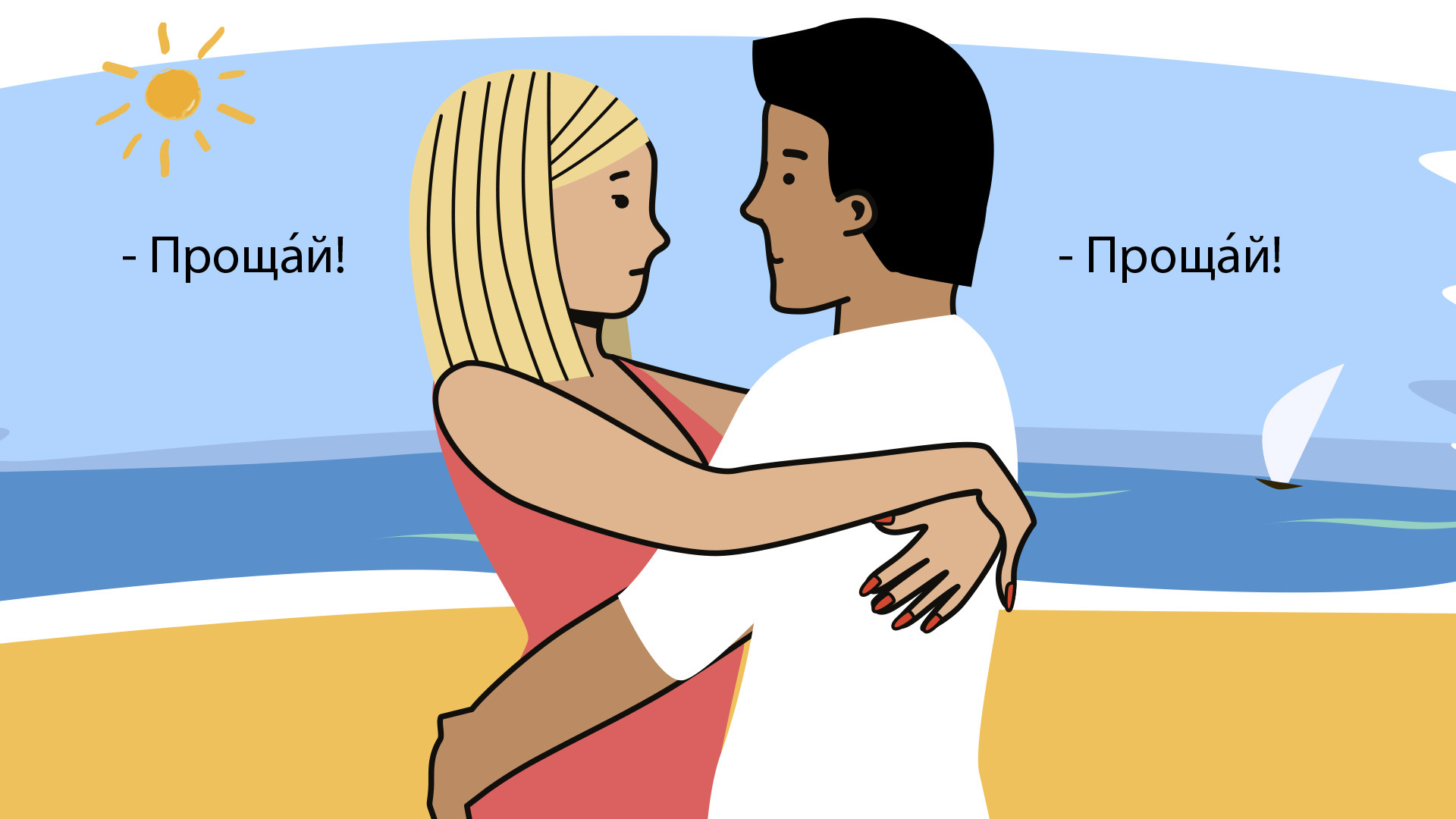
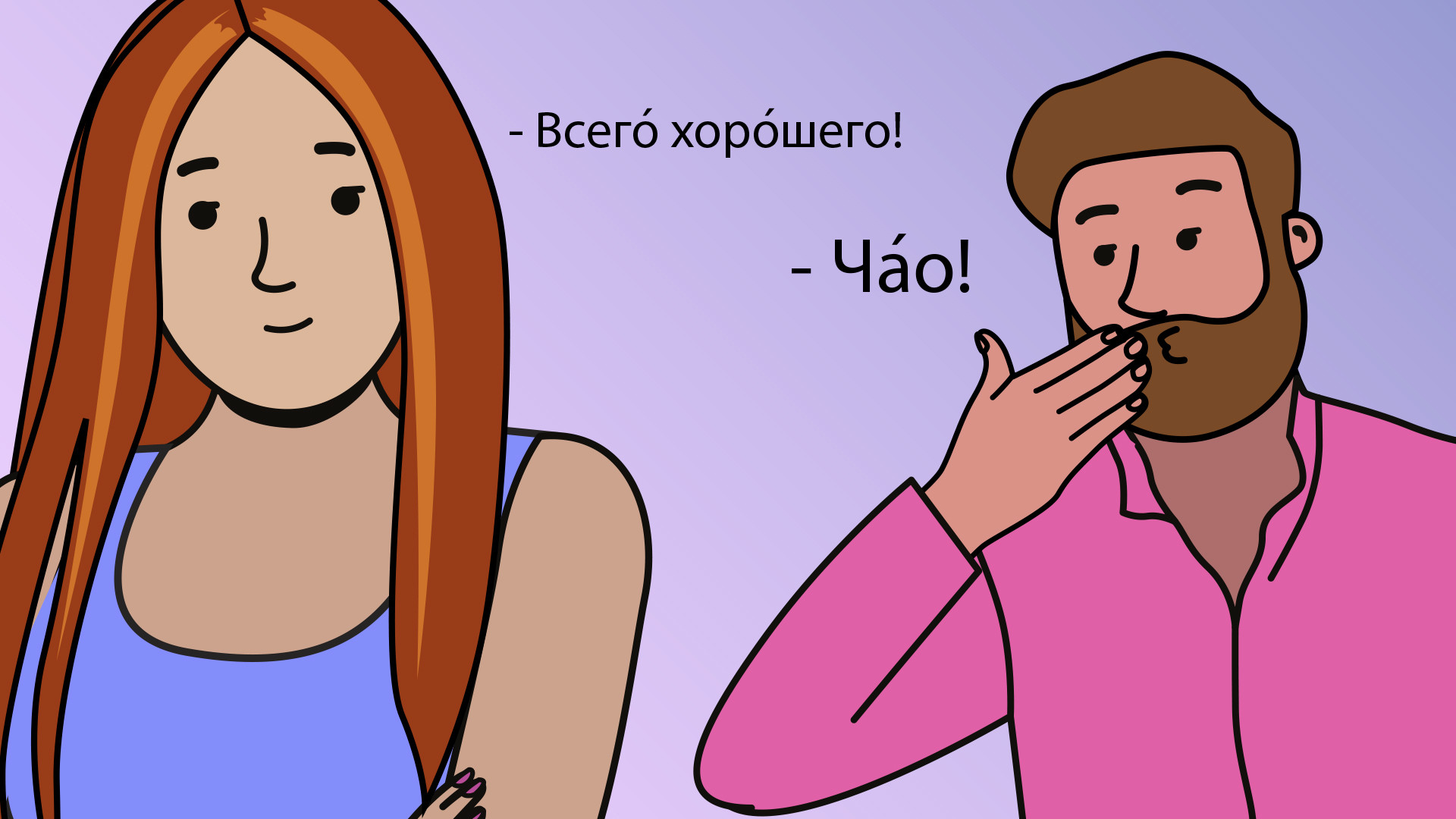
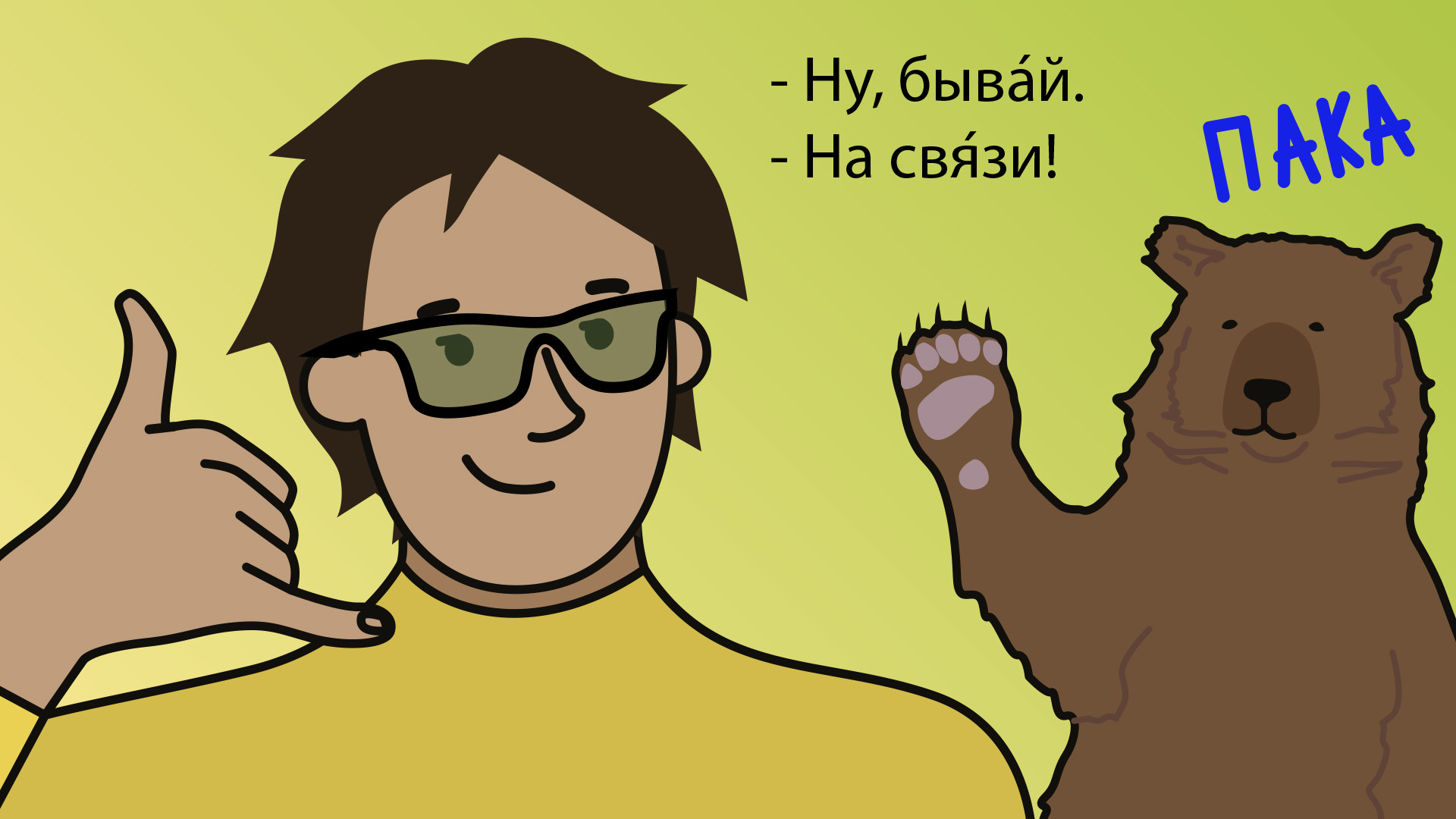
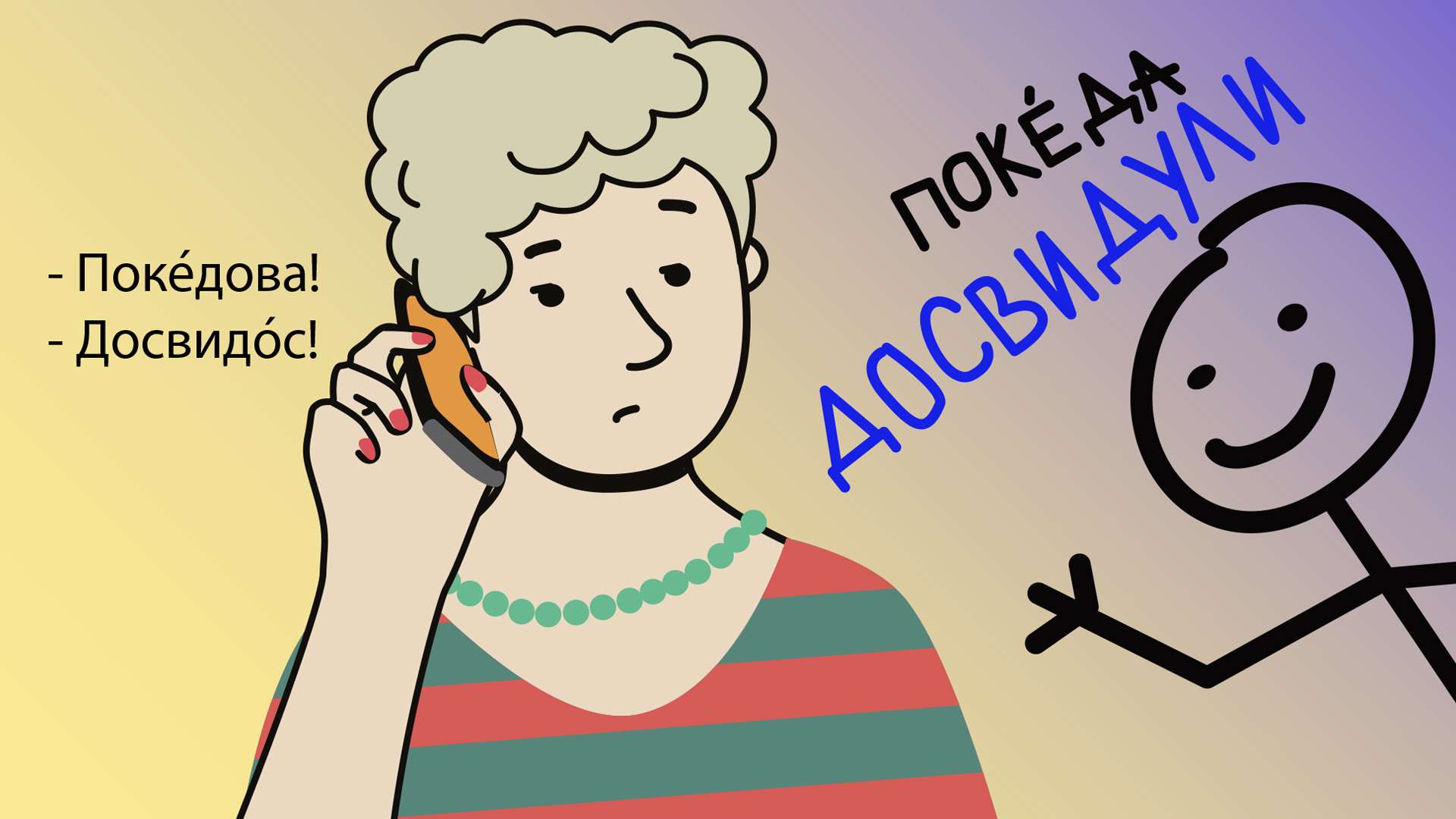
:max_bytes(150000):strip_icc()/GettyImages-155017116-025e384a40db40f896309341638f372f.jpg)







